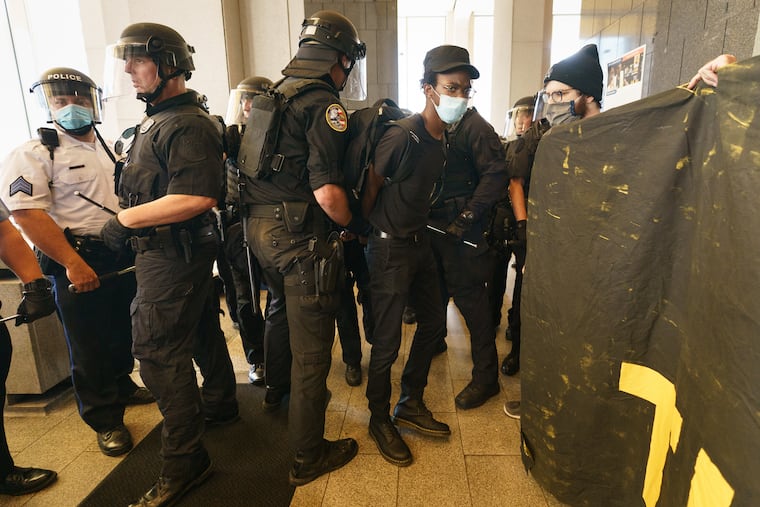How passive voice can make protesters seem bad and let cops off the hook | The Angry Grammarian
Maybe you learned growing up that you should avoid writing in the passive voice. But no one told you that doing so can be a matter of life and death.

A month after George Floyd was killed, protesters — who sometimes clash violently with police — continue to fill the streets of Philadelphia and cities around the world. Ugh, no. Let’s try that sentence again.
A month after police killed George Floyd, the streets of Philadelphia and cities around the world continue to be filled with sometimes violent clashes between police and protesters.
Maybe you learned growing up that you should avoid writing in the passive voice. But no one told you that doing so can be a matter of life and death. These two sentences are textbook examples of why: because passive voice eschews responsibility for action. The sentences are factually equal, but their active/passive-voice dance affects how you feel about what occurred.
“George Floyd was killed” is in the passive voice, which allows a grammatically correct sentence without assigning any agency — that is, without telling you who killed George Floyd. After the comma, however, the sentence switches to active voice: The protesters are the ones who “clash violently” and “fill the streets.” Protesters are bad, and police are off the hook.
Now look at the second sentence. Before the comma is active voice — ”police killed George Floyd” — but then the second half switches to passive voice to favor the actions of the protesters.
Every article you’ve read for the last month has subtly shaped your perception of what’s going on by performing this active/passive voice shift.
Take, for example, the New York Times. In a single article this week, the Times wrote:
“George Floyd, a 46-year-old African-American man, died in Minneapolis on Monday after being handcuffed and pinned to the ground by Derek Chauvin, a white police officer” — you have to get to the very end of a long sentence to learn that Floyd died under the knee of a police officer.
“That night, hundreds of protesters flooded into the Minneapolis streets. Some demonstrators vandalized police vehicles” — assigning responsibility to protesters through active voice.
“In Indianapolis, a person was killed and three others injured after shots were fired at demonstrators” — no agency for who committed the shooting at all.
“Protesters clashed with the police” — protesters, as the subject of the sentence, are responsible for “clashing.” Police are the object, and therefore not responsible and not accountable.
» READ MORE: Brawl ensues near South Philadelphia Columbus statue after march, protest at Municipal Services Building
Not to single out the Times. Over the last month readers could find similar examples in coverage from NPR (“Peaceful Protesters Tear-Gassed to Clear Way for Trump Church Photo-Op”), CNN (“Kendrick Sampson says he was shot with rubber bullets”), ABC News (“Journalists have been arrested, tear gassed and more — sometimes live on air”), The Hill (“Both were shot with rubber bullets and faced the tear gas thrown at protesters near the White House”), Salon (“The protesters outside of the White House were shot with rubber bullets, choked with tear gas, and beaten by police”), Fox News (“Authorities deny tear gas used on protesters prior to Trump’s walk to DC church”), USA Today (“Government agencies and protesters … are at odds over whether the chemical irritant deployed near the White House was tear gas”), USA Today again (“Journalists blinded, injured, arrested covering George Floyd protests nationwide”), and most every hyperlocal news operation in America, many of them the only source of information in their communities.
Each one of these sentences is a micro-influencer on how you interpret what you’re reading. They ignore or bury the fact that it was people who shot those rubber bullets or fired those tear gas canisters. They can shape whether you fault police or protesters for violence, and whether you think cops acted appropriately or too aggressively. Under scrutiny, they reveal the sometimes conscious, sometimes unconscious biases of reporters.
Passive voice has its place. But question every verb as if your life depends on it. Because it might.
The Angry Grammarian, otherwise known as Jeffrey Barg, looks at how language, grammar, and punctuation shape our world, and appears biweekly. Send comments, questions, and middle voices to jeff@theangrygrammarian.com.